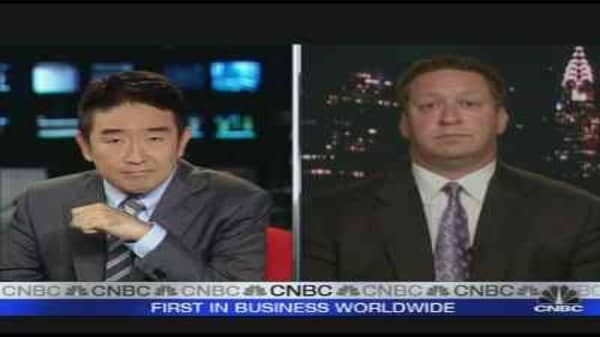An inflation gauge rose at a 3.6 percent rate during the quarter. Core inflation, which excludes volatile food and energy costs, increased at a 2.3 percent pace, down slightly from the fourth quarter's 2.5 percent rate, but still outside the Fed's comfort zone which caps out at 2 percent.
(Is it time to short the market? Click on the video at left.)
Jobless claims for last week were unchanged but the four-week moving average climbed by 2,250 claims to 378,250, the highest level in nearly three years.
Existing-home sales rose 2 percent, slightly better than expected, in May, the National Association of Realtors reported. Inventory shrank to a 10.8-months supply, though the median national home price fell 6.3 percent from a year ago to $208,600.
Rippling through the market was Goldman Sachs's downgrade on U.S. brokerage firmsto "neutral" from "attractive." The firm said there simply aren't any catalysts to push the stocks higher in the coming months.
Goldman analyst William Tanona said Citigroup and Merrill Lynch may be forced to take writedowns of $8.9 billion and $4.2 billion, respectively, and raise additional capital. He also added Citigroup to Goldman's "Americas conviction sell" list.
Goldman has fared better than many of its rivals because it's less exposed to the subprime mess. But Wachovia still downgraded Goldman to "market perform" from "outperform," citing a weak outlook for capital markets.
Many of the financials were trading at a multiyear low: Citigroup was at a 10-year low, Merrill was at a five-year low, Bank of America was trading at a 7-year low and regional bank Wachovia was at levels not seen in about 17-18 years.
Goldman Sachs also cut GM to "sell" from "neutral", reducing its price target to $11 from $19.
A little perspective: GM shares are now trading at their lowest level since 1955, when Dwight Eisenhower was in the White House and Elvis was debuting on the Ed Sullivan show. The auto maker's market cap is now $6 billion, putting it in the bottom 10 percent of the S&P 500 by market cap, below H&R Block and Mattel .
A slew of other Dow components were trading at single-digit multiyear lows, including American Express , UTX and 3M .
A pair of earnings reports from the tech sector after the closing bell Wednesday roughed up the sector today -- not because of the earnings but because of the weak outlooks.
Research In Motion, the maker of the Blackberry smart phone, reported a higher first-quarter profit Wednesday, but its shares dropped sharply in after-hours trading as the results and outlook fell short of analysts' expectations, and then tumbled more than 10 percent in today's session.
Software maker Oracle reported a higher quarterly profit, beating Wall Street estimates, as new software license revenue climbed 27 percent, but its shares fell more than 3 percent in premarket trading as its financial chief said the firm sees software license sales growth softeningin the current quarter. Its shares fell more than 3 percent.
In mergers and acquisitions news, Anheuser-Buschis expected to reject InBev's unsolicited $46.3 billion offer as too low and outline its own restructuring plan, the Wall Street Journal reported.
In earnings news, Lennar, the second-largest U.S. home builder, reported a smaller quarterly net loss as it cut expenses by 60 percent, but the results were worse than expected as deliveries and new orders tumbled.
On the economic front, Warren Buffett warned that U.S. inflation is "exploding", despite the fact that the Fed held rates unchanged.
Still to Come:
FRIDAY: Personal income and spending; consumer sentiment; KB Home earnings
Send comments to cindy.perman@nbcuni.com.



